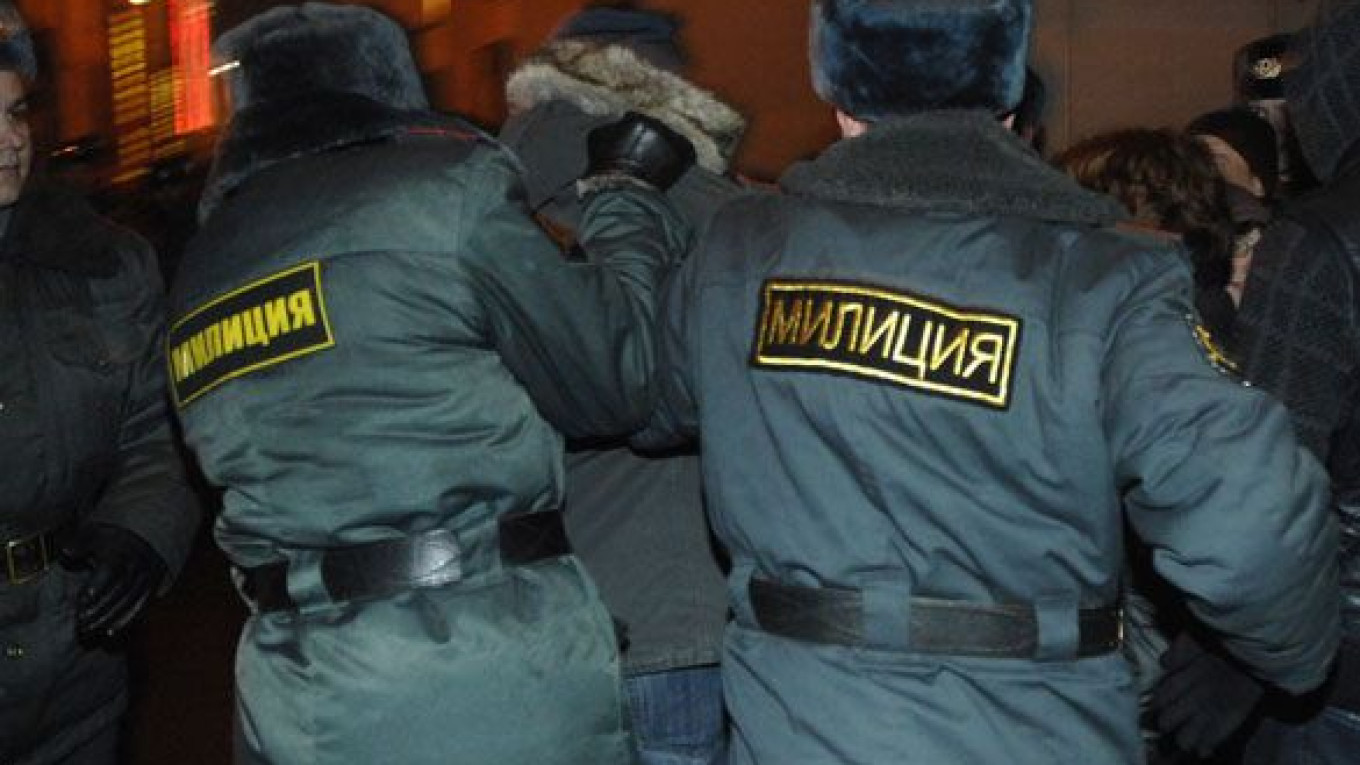A study conducted by the Interior Ministry a year after police Major Denis Yevsyukov went on a supermarket shooting rampage has found that he was not an isolated case and that nearly 10 percent of senior police officers have psychological problems that interfere with their duties.
Law enforcement experts said the overall figure for unfit police officers was much higher, topping 20 percent, and urged the Kremlin to ramp up plans to reform the country's notoriously corrupt police force.
The study of 21,000 senior police officials found that 1,906 of them have "disorders related to social and psychological adaptation," according to the new study, which was commissioned last year after Yevsyukov went on an April 2009 drunken spree that killed two people.
The number of police chiefs displaying “inadequate management style” increased to 526 from 367 in 2008, and the number of police academy officials suffering from the same problem quadrupled to 47, according to the study, which was carried out by the Interior Ministry's recruitment office and published by Noviye Izvestia on Wednesday.
An inquiry about the report sent to the recruitment office went unanswered Wednesday.
The actual number of police officers unsuitable for the job for psychological reasons is likely to be several times higher than the ministry's figures, experts told The Moscow Times.
In all, the police force boasts 210,000 senior officials, so about 19,000 of them have "disorders related to social and psychological adaptation," said Mikhail Pashkin, head of the Moscow Professional Union of Police Officers.
"It's not all right when a mentally ill person has a gun," Pashkin said.
Dmitry Povarov, head of the Moscow branch of a nationwide police union, voiced surprise at the number of police chiefs deemed "inadequate" and said it was high.
Prominent forensic psychiatrist Mikhail Vinogradov, who works closely with law enforcement agencies, said 20 percent of police officers "should be kicked out" because of psychological problems or low ethical standards, while another 10 percent needed counseling to stem developing psychological problems.
The Soviet system of psychological evaluation used by the police force was destroyed in the early 1990s, allowing police commanders to make hiring decisions based on cronyism, Vinogradov said. He said the change in recruitment methods had brought "money hunters and mentally ill people" to the police force.
Povarov said police chiefs preferred to recruit loyalists regardless of their professional qualities.
Pashkin spoke of unfit officers "getting police jobs through connections or money." He also said the psychological problem most rampant among officers stems from "pressure to jail innocent people."
A former Moscow police official agreed. "No police chief is mentally sane because every day they have to make decisions that go against their conscience," she said, speaking on condition of anonymity for fear of reprisal.
Police staff should be rotated at least every five years to prevent psychological problems, she said.
Replacing all senior police officials is the only sure way of clearing the force of people with psychological issues, Povarov and Vinogradov said.
Attracting better-educated people is another option, but it requires increasing the salaries of rank-and-file police officers, Pashkin said.
President Dmitry Medvedev ordered a broad reform of the police force in December. In February, he signed a decree ordering the Interior Ministry to develop the legal framework for the reform and submit it to the State Duma by year-end.
Interior Minister Rashid Nurgaliyev said the police force would be reduced by 20 percent in the next two years, but officers who make the cut will get a threefold increase in salary.
A Message from The Moscow Times:
Dear readers,
We are facing unprecedented challenges. Russia's Prosecutor General's Office has designated The Moscow Times as an "undesirable" organization, criminalizing our work and putting our staff at risk of prosecution. This follows our earlier unjust labeling as a "foreign agent."
These actions are direct attempts to silence independent journalism in Russia. The authorities claim our work "discredits the decisions of the Russian leadership." We see things differently: we strive to provide accurate, unbiased reporting on Russia.
We, the journalists of The Moscow Times, refuse to be silenced. But to continue our work, we need your help.
Your support, no matter how small, makes a world of difference. If you can, please support us monthly starting from just $2. It's quick to set up, and every contribution makes a significant impact.
By supporting The Moscow Times, you're defending open, independent journalism in the face of repression. Thank you for standing with us.
Remind me later.


